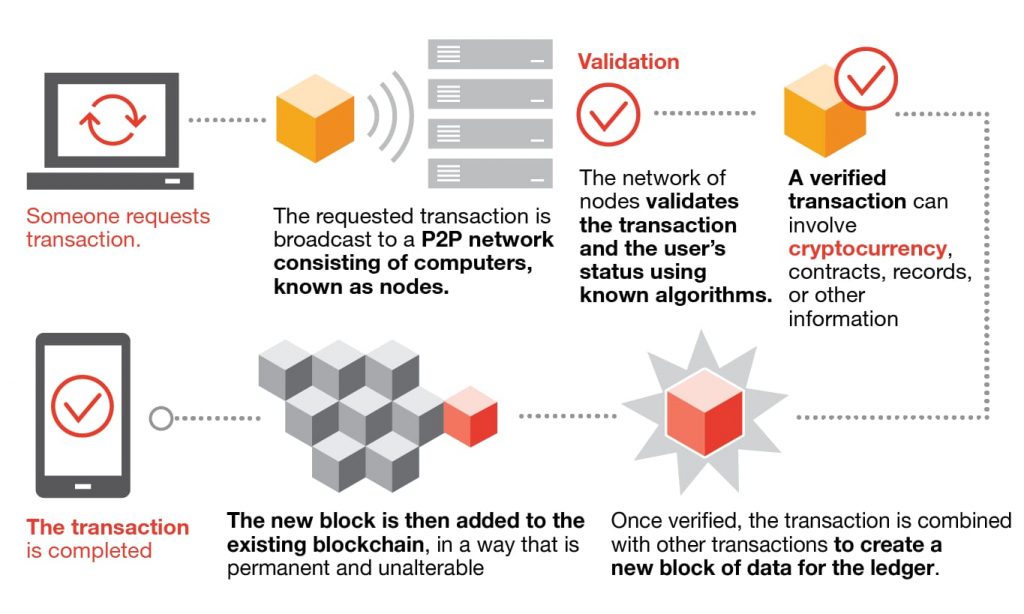Time is money, and both time and money are evolving rapidly. The discovery of the internet disrupted the way the world operated, bringing political, business, economic and social changes. It improved business processes and made online transactions, and banking, among other things, quicker and less complicated. And this is just the beginning; we humans are, after all, constant inventors and innovators.
Traditionally, political, economic, and legal systems structures are defined by contracts, transactions, and records. Nations and organisations set boundaries of operation to identify and chronicle managerial and social events.
But now it’s time for economic transformation. However, the slow and administrative regulations are stifling the digital transformation.
Blockchain technology is here to help!

What is Blockchain?
Blockchain is an open, distributed technology that enables the process of recording unalterable transactions and tracking assets. Blockchain works on five basic principles:
- Distributed database
- Immutable records
- Transparent access
- Algorithm-based computational logic
- Two-way participant transmission

Blockchain gets its name because of the way the transactions are grouped together into blocks of data, then chained together by way of a mathematical function that creates a hash code
Blockchain has disrupted the business industry with its application in financial services, healthcare, artificial intelligence (AI) and the internet of things (IoT) for supply chain, retail sector, oil and gas, telecommunications, insurance, smart contracts, voting and crypto of course.
So, how do blockchain technology and cryptocurrency work together?
Since its first implementation in 2009, blockchain has not been well known. Blockchain technology is the foundational technology for cryptocurrency, which was first implemented just a decade ago but was revolutionised with the widespread use of the application by Bitcoin. Bitcoin was the first cryptocurrency and operated through blockchain.

Blockchain made it possible to record bitcoin transactions without a central authority establishing trust in a trustless environment. Being a digitalised, decentralised, public ledger, blockchain allows the formation of digital information into blocks, which are stored across a network of computers, creating a database. When verifiable transactions take place, the data is stored in blocks, which, when complete, are added to the chain.
Cryptocurrencies like Bitcoin, Ethereum, Litecoin and, USD Coin are used to buy goods and services. And cryptocurrency uses blockchain, an enhanced cryptographic security system, as a public ledger with immutable records that cannot be deleted or altered.
Cryptocurrency is used as a digital form of cash to buy goods and services through various trading platforms or digital wallets. The blockchain technology here records the transaction when ownership is transferred to the new owner. Every transaction, therefore, is a public ledger, unalterable, secure and time-stamped.
The pace of technology will not slow down. Cryptocurrency and blockchain hand in hand continue to disrupt much more than the financial services industry.
What are your thoughts? Share in the comments below.

Good article!
Blockchain is best know for cryptocurrency, but it has a lot of potential in other areas such as smart contracts for real estate and procurement. Even the ledger format of blockchain allows for more utility usage on banking, data/information storage and customer service.
The article was a good introduction to blockchain.
The anonymity of the transactions seems to be a great concept, yet after trading in crypto for a few years now, I see room for third party oversight. I’m my opinion oversight is required to make crypto-currency viable in the long run. Work completion, (proof of work) and contracts seem to be part of the solution. I feel that we still need oversight to limit underworld trades or at least force those currency streams into the light where it can be monitored and if interdiction is necessary, the third party would be able to act. This of course subverts part of the idea of a strict two party transaction or contract. Unfortunately there are enough criminals who will move their currency across these unmonitored networks and continue to prosper by contributing to our global ills.
A third party, though not ideal, seems to be the only way. Crypto-currency would have more attributes of fiat currencies that can be tracked and even devalued as it is misused.
Regards,
David Willis
Student,
RKC/Cumbria University
Hi David,
Thank you for your comment and for sharing your thoughts on the subject.
I’m starting to think I need to reconsider my own thoughts on this topic. That’s how highly influential your views are in this article. I’m sure I’m not the only reader who feels this way.
Thanks For Sharing This Article. It’s Very Much Helpful For Us. To Understand The Digital Currency.
codes are created by a math function that turns digital information into a string of numbers and letters.
If that information is edited in any way, the hash code changes as well.
Waiting For The More Exclusive Articles LIke This. Once Again Thankyou So Much For Sharing.
You are welcome. We are pleased that you found the article helpful.
Amazing article. Thanks for sharing. Its very helpful for people like me who is gathering knowledge about digital currency. looking forward for some more helpful content from you.
Hi, Thank you for your comment! Hope you continue to follow our posts and find them helpful.
Great Article,
That’s amazing your information is really valuable to me, I didn`t know much about blockchain and cryptocurrency. but I always want to know some informative information related to this, you helped me thanks for that. I have a question for you “is cryptocurrency replacing the currently used payment methods”?
Hi, It’s good to know that the blog helped you learn more about Cryptocurrency and blockchain. To answer your question, no, cryptocurrency is still in initial stages of currency evolvement, where traditional payments methods cannot be replaced fully.
This is an amazing article; thank you for sharing it! Blockchain technology is rapidly evolving these days, and most people are unaware of blockchain app development. looking forward to more great content!
Thank you Jasper. We will continue to work towards providing educative content for our readers.
Well, NFTs are also a concern in terms of environmental impact because they are stored on blockchain networks that consume a significant amount of energy
This is an incredibly important topic to explore, as the future of cryptocurrency is uncertain without clear regulatory guidelines. This article offers a comprehensive overview of the current situation and provides a great starting point for further research.
Thank you Rohma. I am glad you found the blog informative and useful resonating the current financial trends.
Hi Vidhi,
The article provides a balanced analysis of the potential benefits and drawbacks of these technologies, highlighting their potential to revolutionize the way we conduct financial transactions, while also acknowledging the challenges and risks associated with them.
Overall, the article is a great introduction to the world of cryptocurrencies and blockchain technology, and I found out this to be a really useful resource for to gain a little better understand.
Best Regards,
Hi Arnab, Thanks for your kind words. It’s great that you found the information shared about cryptocurrency useful.
I particularly enjoyed the section on the benefits of cryptocurrency. The points made about increased security, privacy, and financial inclusivity were well-articulated.
Thank you. Appreciate your comment, I am glad you enjoyed reading the blog.
Great article! I thoroughly enjoyed reading your blog post. The way you presented the information was clear and concise, making it easy to follow along. Your insights on the topic were thought-provoking and added depth to the discussion.
Thank you. I am happy you liked our blog. I hope you continue to follow our posts and enjoy them.
I particularly appreciated how you supported your points with relevant examples and data. It strengthened the credibility of your arguments and helped me understand the subject matter better. Additionally, your writing style is engaging and kept me captivated from start to finish.
I am happy you liked our blog. I hope you continue to follow our posts and enjoy them.
Wow, this article really opened my eyes to a whole new perspective! The way you presented the information was both insightful and engaging. I appreciate how you provided well-researched facts and supported your points with real-life examples. It’s clear that you put a lot of effort into crafting this piece
Thank you for your kind words. I am glad you found the information on the blog insightful.
Thank you for sharing this Informative post.
Thank you. I am glad you enjoyed reading the post.
Wow, what an insightful and thought-provoking blog post! I thoroughly enjoyed reading your article and found it incredibly informative.
Hi, Thank you for your comment. Hope you continue to enjoy our posts.
This blog provides a comprehensive overview of Cryptocurrency and Blockchain Technology. It’s a valuable resource for anyone seeking to understand these revolutionary concepts. From explaining the fundamentals to discussing their real-world applications, this article covers it all concisely.
Hi Andrew, thank you.
I wanted to take a moment to thank you for your informative and well-written blog about cryptocurrencies. Your ability to simplify complex topics without compromising accuracy is truly remarkable. Keep up the fantastic work!
Thank you Mayuri. I am glad you enjoyed reading the blog. Appreciate your kind words.
Blockchain is a revolutionary tech and this is vital part of our future global digital economy powered by web 4.0 + AI + Blockchain & Crypto. That’s why this tech will keep developing and evolving, we already have interoperable;e blockchains able to communicate and transmit transactions… The adoption rate is faster than the internet adoption of the 1990s. This is truly revolutionary!
Hi David,
Thank you for sharing your thoughts on the subject with our readers.
Adding on to my comment: Crypto market is still very strong and has again proven critics wrong. The second US allows Bitcoin ETF, ETH ETF + Interest rate hikes stop = this will have an immense global effect on the total crypto market cap and adoption rates. If no major economic crisis happens (all else equal) we should see a bull run late 2024/early 2025. There is also high probability there will be additional increase (money printing) in US Dollar volume increase that will also fuel the bull run in combination with low interest rates and cheap borrowing. This will be the mega bull ran with potentially the total crypto market cap going over $7-$10 trillion threshold. Overall, Cryptocurrencies have proven to be revolutionary and they can bring lots of benefits to the humanity. That’s why blockchain tech & cryptocurrencies will play pivotal role in our future global digital economy…
Hi David, Thanks for the insightful comment sharing more knowledge about crypto.
Thank you for providing such a comprehensive and insightful guide to cryptocurrency and blockchain technology! I appreciate the clarity and organization of your content, which truly makes it feel like ‘all I need to know’ is right at my fingertips. Keep up the fantastic work!
Hi! We are happy you found our blog insightful. Hopefully, you will also continue to find our other blogs beneficial.